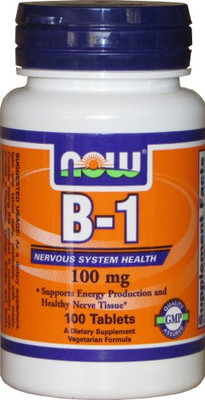Vitamin B1 or Thiamine is a water soluble nutrient that aids the body in converting carbohydrates to glucose and fats into fatty acids that the body can use for energy production. Discovered by the American chemist Robert Williams in 1936, Thiamine was also found to be a coenzyme in the production of neurotransmitters for the maintenance of brain health and functions.
Supplement Facts
Serving Size: 1 Tablet
Servings Per Container: 100
|
|
Amount Per Serving |
% Daily Value |
|
Thiamine (as Thiamine HCl) (Vitamin B-1) |
100 mg |
6667% |
Other Ingredients: Cellulose, stearic acid (vegetable source) and magnesium stearate (vegetable source).
Suggested Use
Take 1 tablet daily, preferably with meals.
- Vitamin B1 along with other B complex vitamins helps in the proper conversion of food into their simpler forms that can be used for manufacturing energy to fuel the body. Thiamine is involved in metabolising carbohydrates to glucose, proteins to amino acid, and fats to fatty acids, which can be used by the cells to produce ATP or cellular energy. The energy produce is then used by the brain, heart, muscles, and other organs to function.
- Thiamine is used to reduce the risk for beriberi, a condition caused by thiamine deficiency in the diet. Signs and symptoms of beriberi include confusion, nystagmus or uncontrolled eye movements, and confusion. When left untreated, beriberi can cause fluid in the lungs characterised by troubled breathing.
- Preliminary evidence suggests that Vitamin B1 promotes eye health. Those with enough supply of thiamine and other nutrients from the diet or from supplements were found to less likely develop cataracts.
- Vitamin B1 protects the brain and the nerves from Wernicke-Korsakoff syndrome. Experts suggest that the symptoms of Wernicke-korsakoff syndrome like memory loss, impaired muscle coordination, and nerve problems are the effects of the brain’s reaction to low levels of thiamine.
- Taking Vitamin B supplements are recommended to reduce the negative effects of alcoholism to health. Increased alcohol consumption greatly reduces the body’s thiamine levels, which is linked with brain disorders, malnutrition, and impaired muscle coordination.
Vitamin B1 or Thiamine belongs to the water soluble B complex family of vitamins. The 8 B vitamins are used to efficiently metabolise carbohydrates, fats, and proteins to produce energy. Carbohydrates are converted to glucose, fats are converted to fatty acids, and proteins are converted to amino acids, these simpler forms of nutrients are then used by the cells to produce ATP that fuels the brain, heart, muscles, and other organs. As a coenzyme, thiamine helps with healthy production of neurotransmitters in the brain that maintains healthy nerve tissues and functions. Vitamin B1 is richly found in the diet, including pork, organ meats, whole-grains, cereals, rice, legumes, brewer’s yeast, wheat germ, and blackstrap molasses. Because it is found in sufficient amount in a wide variety of foods, deficiency of thiamine is uncommon, especially in first world countries. Alcoholism is the most common cause of low thiamine levels, which may require eating more Vitamin B1-rich foods or taking Vitamin B supplements.



